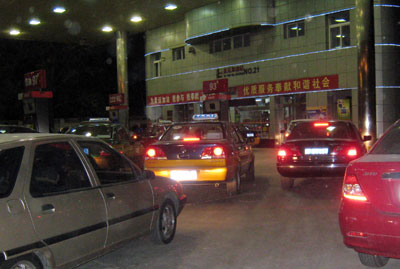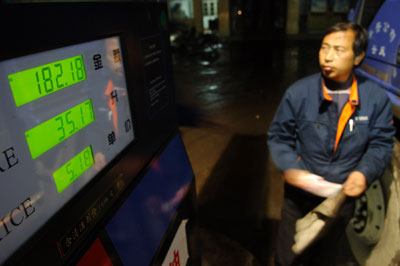 |
|
Cars line up in front of a gas station in Beijing Wednesday night, October 31, 2007, a day before the fuel price rises came into effect. The National Development and Reform Commission (NDRC) announced that the prices of gasoline, diesel oil and aviation kerosene would be raised by 500 yuan () per ton. (Xinhua newsphoto) |
The prices of major oil products have been raised 8 percent from Thursday to encourage loss-making refiners to step up production and reduce shortages.
The National Development and Reform Commission (NDRC), the country's top economic planner, announced Wednesday night that the prices of gasoline, diesel oil and aviation kerosene would be raised by 500 yuan ($68) per ton.
That translates into motorists paying 0.4 yuan or 0.46 yuan more per litre of gasoline or diesel.
The revision was made to reduce the gap between soaring global crude prices and domestic fuel prices, the NDRC said.
"The gap between the prices of global crude and domestic oil products is widening, leading to heavy losses for refiners. For quite a period of time, certain regions have faced a shortage of oil products or tight supply The price increase is expected to reduce refiners' losses and ensure supplies," it said.
 |
|
A driver refuels his car at a gas station in Anqing, East China's Anhui Province early Thursday morning, November 1, 2007, when the fuel price rises came into effect. (Xinhua) |
The price hike will lift the monthly consumer price index (CPI) by 0.05 percentage point, the NDRC pointed out. Although the direct impact of the price hike on the CPI is limited, the NDRC said it will still try to fend off ripple effects on prices of other products, such as grain, pork and edible oil.
The cost of rail cargo and air travel will go up correspondingly but rail and public transport fares will remain unchanged.
The government may subsidize taxis for higher fuel cost.
The NDRC asked oil majors such as Sinopec and PetroChina to raise refining output, increase diesel imports and strictly control diesel exports.
The NDRC has long been keeping a tight lid on domestic fuel prices to keep inflation at bay, only allowing refiners to set fuel prices within an 8 percent band of a government-imposed benchmark. But many small refiners - owned privately or by local governments - have stopped production due to soaring prices of crude. (By Wang Yu)




